'Parliaments Are Supposed to Work For Us': Aruna Roy Responds to RTI Amendments
'Parliaments are supposed to work for us'
We ask Aruna Roy about the government’s recent amendments to the Right to Information Act, 2005 recently passed in the Rajya Sabha amid an opposition walkout.
The amendments give the executive the power to alter the salaries and tenures of Information Commissioners at will.
Roy is a former IAS officer and right to information campaigner who co-founded the Mazdoor Kisan Shakti Sangathan in 1987.
She responds to our questions from Beawar, where the first major agitation for the right to information took place in 1996.
In Beawar, Roy tells us, the municipality has erected a pillar in commemoration of the RTI Act.
Have the amendments to the RTI Act virtually killed the concept, or does some basic ingredient still remain?
Information is a birth right. Universal human rights are based on this fundamental right; constitutions including ours are framed on this concept. Laws like the RTI are enacted only ensure access to those rights.
No amendments or decisions, by a representative or even a parliament acting without a specific mandate, can counter the people’s will.
The concept is intact. The mechanism of access needs to be protected, regained, and strengthened.
Would you recall for us why and how the RTI is important for ordinary people?
The amazing numbers of common persons – and their response across India to the recent amendments – stand testimony to the fundamental transfer of power that was effected by RTI in legitimising the right to ask questions.
We must remember that a decade ago, those who asked questions were liable to be arrested, for disrupting the mechanisms of state. This will revert the system to impunity for running an unequal and corrupt government.
The only way people can connect to any right with legitimacy is to base their demands on facts.
Beginning with the performance of politicians we invest with power, who garner our fundamental sovereignty with a social contract to work for our fundamental rights, to the policies and enactments made for our benefit – parliaments are supposed to work for us.
The refusal to send the bill for examination by a standing or select committee in the Lok Sabha and Rajya Sabha, transgresses a contract which arises from the transaction of the vote.
The vote is not a carte blanche.
India is perhaps the only country with such a forward looking Act?
It was rated number two among such Acts framed in the last decade and a half. But given the failure to appoint commissioners and the clear hostility of the government, it has now dropped to 8th place.
The South African law which was framed after the Indian RTI goes many steps further. In their law the right to information is a fundamental right and can be used in the exercise and pursuit of all other rights.
Scandinavian countries have fully open governments with completely open systems. They have managed to achieve the move from a culture of secrecy to a culture of openness.
Weren’t there problems in implementing the RTI Act’s provisions earlier as well?
Yes indeed. But they followed parliamentary procedure ethically.
Even if the reference to a standing committee or select committee is ‘technically’ optional, most important Acts were sent to these committees. Especially when there was a public objection articulated through protests, in writing or through public action.
We, the people, managed to assert ourselves because there was respect for democratic assertion based on reasoned arguments.
What do you make of the fact that some opposition parties supported the government in Parliament – and the Defence from the others was muted?
The parties who opposed the amendments put up a spirited fight, and tried hard for it to be sent at least to a select committee.
Unfortunately the BJP was determined to bulldoze the amendments through both houses of Parliament.
The Prime Minister reportedly called up some opposition leaders to have them vote for the amendments, even though they had been opposing them.
The RTI is clearly not popular with anyone in power – basically the RTI asks for sharing power.
The old adage that information is power is true. That being so, RTI actually enabled the dismantling of power, where power behaved in a corrupt framework, or misused power.
Therefore many of those in power have been uncomfortable with the Act, which by sharing information, invites scrutiny and accountability.





